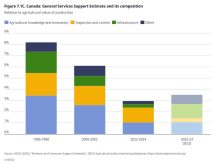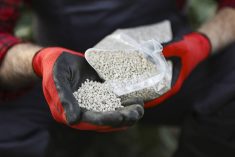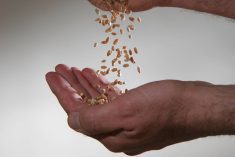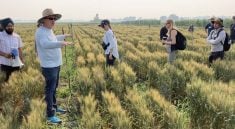A new Agriculture and Agri-Food Canada report shows farmers remain concerned about federal emissions reduction targets on fertilizer and whether those targets remain voluntary.
The “What We Heard” Report, released March 22, is the result of consultations between AAFC and the agricultural sector to gather feedback on how best to support farmers and producers to achieve a 30 per cent reduction in fertilizer-related greenhouse gas emissions from agriculture by 2030, a stated federal goal since 2020.
Why it matters: The federal goal to reduce fertilizer emissions has been a hot button topic in Canadian agriculture.
Read Also

Farmer mental health support extended in Manitoba
The Manitoba Farmer Wellness Program is slated for $300,000 over the next two years for its farm mental health services
More than 2,000 submissions were received through online consultation, technical workshops and town hall meetings between March and October 2022. Farmers, industry associations, provincial and territorial governments, scientists and environmental organizations provided input.
A large number of respondents questioned whether a fertilizer emissions reduction target was needed, a sentiment often coupled with concerns that a mandatory target might later be imposed.
A significant number of respondents said they preferred an intensity-based reduction in emissions rather than an absolute reduction. They were also concerned about how targets might impact production.
Farmers were worried that climate change policies might not take the economics of emission reductions into consideration, to the detriment of their bottom line, the report noted.
Respondents also cited concern that blanket policies might not reflect the regional diversity of the agriculture sector in Canada. Responses indicated that more localized data and increased extension services would help producers adopt nitrogen management practices.
While there were many concerns with the program, there was also significant buy-in. Many respondents said they recognized the need to act on climate change and were on board with reducing emissions. But they also wanted recognition for the role that Canadian farmers play in promoting sustainability, which many respondents felt pride in.
Keystone Agricultural Producers president Jill Verwey said her organization was encouraged by the report.
“KAP is pleased to see recognition from the federal government that Canadian farmers are already taking action to improve resilience and enhance profitability while reducing emissions on-farm,” she said.
Verwey noted that KAP participated in a number of consultation sessions for the federal government’s Sustainable Agriculture Strategy.
“The priorities of Manitoba farmers include a focus on utilizing an incentive-based model for the adoption of sustainable practices, financial recognition of early adopters and other strategies with an emphasis on economic viability for farmers,” she said.
She added that KAP would continue to advocate for the inclusion of these priorities in any federal programs or strategies.
Agriculture and Agri-Food Minister Marie-Claude Bibeau acknowledged that fertilizers are an essential input for farmers as part of the report.
“We need to ensure that our efforts to reduce emissions do not undermine their competitiveness or their vital work, especially at a time when food insecurity has reached unprecedented levels worldwide and the fertilizer supply chain is increasingly strained,” she said.
Bibeau also reiterated the voluntary nature of the targets.
“I would like to be clear; there is no mandatory reduction in fertilizer use on Canadian farms. Instead, we want to support measures that producers can take voluntarily to reduce their emissions over the long term without curtailing growth in crop yields.”
The desire to see better communication and engagement between the government and the agricultural sector also emerged through the consultation. To address this, a fertilizer working group is being formed under the Sustainable Agriculture Strategy Advisory Committee.
Its objectives will be to strengthen the ongoing dialogue between industry and government, examine mechanisms that need further support and improve the measurement and tracking of fertilizer emissions reductions in the sector.
“There is clearly a diversity of perspectives on many key issues, and we are pleased to see the report identify the importance of further producer engagement in advancing this voluntary approach,” said Keith Currie, president of the Canadian Federation of Agriculture. “We are pleased to see the report factor in producer profitability.”
Fertilizer Canada CEO Karen Proud singled out the support of 4R nutrient stewardship conveyed through the report.
“We look forward to continuing to work with the government and producers to improve measurement and accelerate the adoption of 4R best management practices, which reduce emissions and increase productivity,” she said.


















